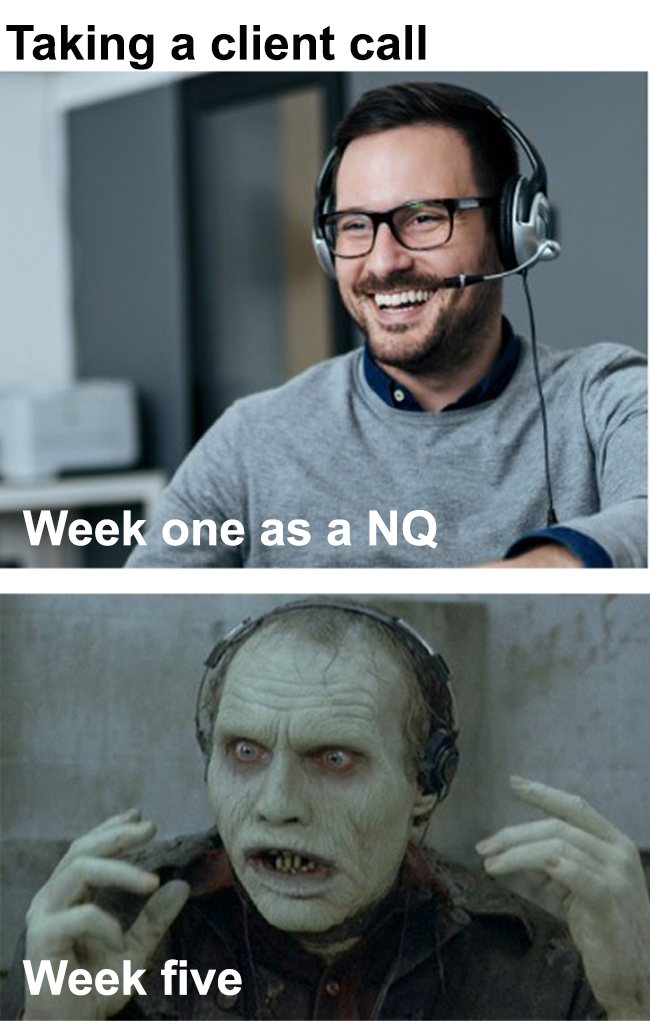
A City NQ tries to look sharp for a client after another all-nighter
In-house lawyers want City firms to lower the salaries of their junior lawyers and not work them to the point of exhaustion, according to results so far in the RollOnFriday In-house Lawyer Survey.
"Control the salaries paid to junior lawyers who know nothing much," said a GC in the aviation sector.
"Lower pay for new associates," said a senior in-house lawyer working in TMT. "Salaries of £100k plus for NQs is ridiculous and we will not instruct firms who pay at this level for and who expect their associates to be available 24/7." Firms should take "better care of their associates," the in-house lawyer added.
Another client said they had enough of "zombified" associates appearing like the "cast of the Living Dead."
"If you're flogging your associates, we're not getting good value for money," said another. "They're not bright and alert when worked to the bone...mistakes are inevitable."
"Stop raising NQ salaries or at least stop passing this on to in-house teams", said a GC in financial services. "It adds no value to us."
Others complained about what they perceived as outdated billing methods. "Move away from the billable hour," said a senior in-house lawyer in a bank. "It makes private practice lawyers work insane hours, give unrealistic estimates, write off huge amounts of time, and impedes their progress and job satisfaction." They noted: "I don't know anyone at my company who would accept a time-based bill. It's all fixed or capped fees."
Another in-house lawyer agreed: "Embrace fixed fees and alternative fee arrangements. The billable hour is dead for us, including in litigation."
"Fixed fees are still a bit of a myth and are generally reverse engineered from the chargeable hour," said a real estate GC. "I'd like to see more genuinely value based billing."
"Kill the billable hour," said a head of legal in retail. "[Firms] say we will do fixed fees etc but their whole remuneration, targets and promotion structure is based on the billable hour."
If you're in-house and agree or disagree, give your two cents below.
![]() Let top firms and companies ping your app when they like you for a role. Keep an ear to the ground with LawyerUp, available on the App Store or Google Play.
Let top firms and companies ping your app when they like you for a role. Keep an ear to the ground with LawyerUp, available on the App Store or Google Play.














Comments
55
31
"a real estate GC. "I'd like to see more genuinely value based billing."
Right so....1.5 - 3% on value of all transactions?
Woah woah woah, just because the purchase is more valuable doesn't mean it takes longer
Everyone should be more honest - they want it cheaper, quicker and better. Unfortunately that is not a thing.
60
31
Their concern is less about the welfare of the NQs and more about how how in-house salaries -particularly at sub-ED level - can't keep pace with the upper end of PP.
55
33
Worth these people looking at their own treatment of firms - the expectation of 24/7 availability comes from clients. These are the same people who criticise if firms add people to the team to lower workloads of existing team members over a long transaction, or to allow overworked associates to enjoy a holiday. And they’re the same people who merrily ask you on a Friday night to turn things “any time before Monday”.
They don’t seem to mind over-working when it’s for something they want…
46
31
Maybe in the case of Shoosmiths, actually pay the staff better? £100k for an NQ is too much but not for an 8y PQE....pretty please?
46
30
Jealousy, lol - a US NQ probably earns more than the GC at a bunch of in-house roles.
The sorts of clients that pay US firms for these sorts of rates are perfectly happy to pay the exorbitant fees in order to be able to have a firm that does what they want, when they want it, and extremely quickly.
49
24
"I'd like to see more genuinely value based billing."
I.e. I would like to see all of the fees be low, no matter how long or how hard you work.
Because if you ever send me a high bill for something that adds lots of value to my business, I'll ask you how you are justifying it by reference to hours spent.
43
28
seems to be a relatively simple solution to the GC's woes - instruct different firms. But that never happens so they can't be that hacked off
39
33
if a client asks for a fixed fee the only rational way to price it, at least in litigation, is to work out how long you think it's going to take and then add a bit for risk. Usually the client ends up asking for an invoice based on time actually spent, or tries to renegotiate the fee after the event by asking how much time it actually took.
48
31
Move away from the billable hour, says clueless moron. Precisely how else are we supposed to value lawyers' time and work? How do you think fixed and capped fees are calculated?
46
26
seems to be a relatively simple solution to the GC's woes - instruct different firms. But that never happens so they can't be that hacked off
40
32
Fewer good cadidates want big law life. Indecent pay, but horrible hours, plus the need to live in high cost cities such as NY, London or Paris. But high demand for candidates from law firms.
Result is a pay war raising entry level compensation for NQ.
However, if you raise the pay NQs, you either need to increase the price of the billable hour billed to the client (which the client objects to because NQs do not know that much), or you increase the number of hours.
The result are even more horrible hour requirements, fewer candidates who want that life, and even higher NQ comp because the firms fight over an even smaller candidate pool.
There are only two ways out of the vicious circle:
- the so-called "third way": lower hour requirements, but also lower (but still good) pay;
- the other way out is more cynical: economic downturn.Lower demand from law firms alligns the demand to the supply of candidates wanting to have big law life.
45
35
Speaking as a GC, I care about the working conditions of juniors at firms I instruct. Tired and stressed lawyers make more mistakes; those mistakes end up in my work, and I have to clean up the mess or suffer the consequences.
Their salaries are none of my concern. Yes, many of them out-earn me; that’s fine, we all make our own choices about our careers and our priorities.
Obviously I need to get value for money for my client. If firm X prices themselves out of my budget by paying sky-high salaries, that’s their concern. I’ll go to firm Y instead.
Somehow, though, I suspect the main driver behind price increases is not junior salaries but investor profits. How many juniors out there have seen their salaries rise in proportion to their hourly rate? (And how many were taking home a substantial proportion of what they bring in in the first place?)
40
34
New legal organisations will incorporate AI with much reduce costs. Salaries will decrease.
44
28
Speaking as a GC, I care about the working conditions of juniors at firms I instruct. Tired and stressed lawyers make more mistakes; those mistakes end up in my work, and I have to clean up the mess or suffer the consequences.
Their salaries are none of my concern. Yes, many of them out-earn me; that’s fine, we all make our own choices about our priorities.
Obviously I need to get value for money for my client. If firm X prices themselves out of my budget by paying sky-high salaries, that’s their concern. I’ll go to firm Y instead.
Somehow, though, I suspect the main driver behind price increases is not junior salaries but investor profits. Have many juniors out there have seen their salaries rise in proportion to their hourly rate? (And how many were taking home a substantial proportion of what they bring in in the first place?)
35
35
Good point. NQs may be objectively well paid for what they offer in terms of skills/experience, but they are underpaid compared to the money the make their firms. You may be raking in 160k, but if you're billing 2400 hours at 600 quid an hour ...
42
25
Value based billing is a nonsense. If I do a fantastic job on your SPA, cunningly shifting 75% of the risk onto the other side, but there is a successful claim because stuff happens, does that mean my work was more or less valuable than where I did a really poor job, but there was no claim? How will you ever know?
40
35
Even 110K doesn't get one very far for London housing. -Maybe- a semi-detached terrace in Croyden or Ealing or Bromley or somewhere? Unlike in-house lawyers, PP can't go and live in a rural village in Derbyshire and commute to work once a month. That's why salaries are going up because housing is so extortionate in southeast. I am increasingly thinking the long-term smart move (if one wants some kind of family life) is move near Bristol or Leeds, live in a lovely spot and work from a national firm from there. Yes, I'll never earn KE money or a mega-deal but I am more confident my children might not grow up into unbearable cokeheads with parent issues.
And hours are bad because clients demand it. I had a GC screaming at me on Coronation bank holiday - no real urgency; just being demanding, so then I spend my afternoon working. I should get rewarded for that. If clients didn't want availability, then I am fairly sure hours would decline. But there'll always be someone up for a 10am Sunday call...
37
31
BRAVO!!!
41
27
A happy byproduct for law firms is that because they've hiked up salaries and this has spread in-house, I now can't afford to hire a junior. So either I have to outsource more work to law firms or keep doing it myself. Good game guys.
34
31
@anon 12 May 23 11:45
Screaming at you over the BH weekend? Crikey. What's wrong with these people.
40
26
Friends, take it from a long-suffering insurance goblin: Move away from the billable hour at your peril. The only guarantees in doing so are these:-
1. Whatever the fixed fee your clients are willing to agree to is, it will not be profitable or realistic;
2. As time moves on, that fee will only ever go down, rather than up.
Don't do it, kiddos!
34
36
Someone who says they hate the billable hour but likes capped fees is a dunce.
41
32
£100k + for an NQ is f#@king ludicrous. The industry is now getting itself in a mess with salaries nationally, because of the idiocy of a few firms within the M25.
42
36
Lots of people here citing jealousy - most people in decent in-house teams left PP for a reason and made a risk-benefit analysis on salary. You quite literally couldn’t pay me to go back to my MC firm and endure those hours.
Some clients are certainly unreasonable and want 24/7 service but personally every time I get a piece of non-urgent advice in my inbox at 2am I immediately doubt its quality - I remember only too well trying to do good work on no sleep.
35
33
Completely understand the request for "value based" but not the fact it really means "please ignore the cost of producing this". In no other industry would you ask them to sell you something, but ignore the cost of production. Of course it's time based, even if it becomes a fixed fee etc - the main cost of producing advice is the lawyers' time. If you think the pricing is wrong, that's also entirely reasonable - there are plenty of law firms, just choose one at your price (/value for money) point. But accept that the cost base isn't going to change significantly until it's based on AI licence fees rather than lawyers!
42
30
Copying my comment from last week:
Ex MC, have been in-house for a while. My thoughts:
- We stick with the people we like rather than the firm. If our people left, we would go to their new firm.
- We will pay for quality. Our drift towards instructing US firms, even for English work, has been noticeable as the gap in quality has grown, not just at the top level but increasingly at mid-senior leve (5-7 PQE).
(n.b. contrary to the above comments - we 100% will pay for juniors at the huge going rates. We expect you to be honest in writing off wasted junior time (of which there will be a lot) but we see it as part of the package when we instruct a really good partner that they need help).
- Don't make your team stay up until 4am ruining marriages etc. We generally don't mind if stuff is going to be a little late as long as you tell us. We will tell you if something is really urgent, aside from which we don't like paying USD 600/hr for someone who hasn't slept in days.
- Junior in-house lawyers don't have much control over an existing relationship , but they can definitely influence new instructions. Irritate them at your peril.
- If you have cocked something up, tell us. The reaction will generally be mild annoyance rather than total fury.
- Master the art of educating without condescending. And be nice - it translates into more chances to get something right.
- We will quibble over bills to the point of exasperation. We quibble a lot less when time is well recorded and when we can see there are not 6 people on a single call.
- Check your juniors' work. We have no problem with a 3-5PQE have a crack at something, but if the work product is messy, it gets noted internally.
- If you want an 'in' with us, come and do a presentation for our team. In-house teams don't have the budget for this, so we like and want free training. It's amazing how little firms bother to do this Put some effort in though, we had a City firm send two partners recently effectively rehash of someone's GDL homework, the quality was truly abysmal, and two 15+PQE lawyers producing that sort of quality means that firm is ruled out. Conversely, we just instructed a US firm with a small 'taster' matter off the back of a superb piece of training.
32
34
I completely understand in-housers complaining about associates being beasted. Why would they pay top dollar for someone who is too tired to remember their own name?
But the question of what law firms choose to pay their staff and the capped fees / no hourly billing is ridiculous. As someone has already pointed out, in what other business would the customer think they could demand a pricing model that ignores the cost of producing the service being provided?
In-house lawyers tend to have a rather over-inflated sense of their own importance when it comes to things like this. They forget they are merely the purchaser of a service and not a joint venture partner. They have every right to be concerned about the quality and price of the service they receive, but the way the service provider runs their business is none of their business.
38
31
The problem is that, dependant upon work, it is not known how many hours it will take. Particularly contentious. A lot of work cannot be priced on the basis of a vehicle service, or painting a wall.
So if a fixed fee is applied, it is applied by estimating the time spent (the use of the resource- the brain doing the work), and in many cases, hoping the estimate was accurate. Yes, contingencies can also be built in. But many things crop up outside those contingencies.
Wanting fixed fees means a client usually wants to pay less than what they paid on an hourly rate.
The firm has its margin to make on that person. If the fixed fee is not high enough to match what they would be paid by someone else on hourly rate and meet targets, then margin goes down. That person's billing is reduced and they need to work harder to make it up.
Salaries may then reduce for the 'fixed fee' lawyers. Then the firm cannot attract the correct people.
The alternative is an over generous fixed fee, and none of these in house counsel want to pay more.
The other way to manage the fixed fee is for teh lawyer to spend then less time on the case and the firm put cheaper people on it. And then the outcome is invariably not as good. But hey, the in house counsel could show a saving on legal spend and the reduced outcome on the case is easy to lose - who knows?
This article suggests these counsel are suggesting fixed fees for the good of the lawyer. I can categorically confirm having been in this business for nearly 30 years I have never once heard one lawyer working on a fixed fee be happy about it, as it means more work for less money and compromises and in fact usually causes them unecessary stress.
38
30
It's rare to hear a defence of the billable hour, almost as if law firms and their clients use it because they're too stupid to do otherwise. Time billing continues to be how most private practice lawyers work for very sensible reasons. There have been two excellent summaries which I've saved over the past decade, and which I reproduce here. Feel free to reply with further links if you have any, please.
Comments from under https://www.linkedin.com/posts/aramide-fields_lawyers-inhouse-inhousecounsel-ugcPost-6846415861666971648-PJr2 (this post is a long discussion of the billable hour):
“The smartest companies have those meetings anyway because of how important they are. The thing is that someone has to pay for people's time. It is the reality that we don't work for free. So while not billing by the hour, the company incurs a significant cost whenever it ties up its resources like that.”
“I've tried flat fees and other approaches. I find with complex matters that they always end up being a windfall for the lawyer or client. We are just guessing how much time it takes or what subjective "value" should be. Whoever guessed wrong is out of luck. And that approach sucks for the one on the incorrect end.”
“With billable hours, I am paid for what I actually do and how long it takes me to do it. My billing rate reflects my skill and experience. I've got an ethical obligation to work as efficiently as possible, including bringing into play whatever innovation and collaboration are needed. There's a reason billable hours still dominate despite decades of calling for different approaches.”
And:
In Defense of the Billable Hour, May 3, 2013, Richard Rapp, https://adamsmithesq.com/2013/05/in-defense-of-the-billable-hour/?single
[...] That’s not all that clients demand of their law firms. That’s just item one on the list. Here’s the rest:
- We clients want the capacity to commit legal resources to a problem or project with hardly any investment on our part
- We clients want our suppliers of legal services to bear the full risk of building capacity but we don’t want to agree to long-term contracts or exclusivity arrangements in support of the associated long-term costs.
- In fact, we want to be able costlessly and instantly to stop work for any reason and to drop one supplier and employ another at will
- We want our legal suppliers to be able to provide, on demand, teams of varying size and experience to match the scale and scope of different problems as they arise, typically with very little predictability
- We want suppliers to compete with one another and we want to rely on multiple suppliers, sometimes even within the scope of a single project
- We want the ability to supervise, insofar as possible, the level of activity and expense associated with a given project [...]
What is clear is that the standard billing model has been remarkably robust both over time and across different degrees of clients’ reliance on their legal service providers. That is because billing is just one part of a more extensive arrangement that is full of benefits for the clients and risks for the law firms – a deal that balances the interests of both. [...]"
36
35
As someone who has worked in both PP and in house, I find a lot of the comments in the article a bit bemusing. I'll never understand the "move away from the billable hour" brigade. You're quite literally paying for someone's time. Any other method of billing is, as many have pointed out, a contrivance of the billable hour.
As for bemoaning high salaries in some PP firms, I'm sorry but it's not like you don't have a choice. Last I checked there are hundreds of law firms offering broadly similar services. If you don't want to pay 500 quid an hour for one that works its juniors to death and pays them handsomely for it, then go right ahead and pay 300 quid an hour for a firm that doesn't. Maybe you have to wait longer for the work, but that's a decision only you can make. I suspect your main objection is having to pay a fair market rate to your junior in house colleagues.
33
35
No one can ever win on this one. Fixed fees generally screw over the firm and fees based on time often screw over the client. Everyone will complain and nothing will ever change.
But (speaking from a PP perspective) junior salaries (which ultimately get passed on to the client) are getting absolutely ridiculous. They are simply not worth that money at that stage in their career - I get why it happens in this market, but it is insane.
31
30
Up to 2pqe most lawyers are useless and not worthy of the salary and clients receive awful value for money.
Above that we can have a sensible discussion.
35
35
I don't think clients really hate hourly rates per se (they couldn't and shouldn't give a tug how a lawyer or any business works out the cost).
What they hate is surprises. If you say something is 50k and then submit an invoice for 80k you can see why they are annoyed. If you said 50-90k originally or kept the client up to date with fees then they wouldn't be as annoyed. It's a client care point.
Lawyers can do far better to estimate correctly and keep clients up to date.
Lots of businesses charge on the basis of how long something will take, like labourers and hairdresses and taxi drivers and all sorts.
28
24
As someone who's moved from PP to in-house, I still find the whole 'kill the billable hour' mantra a little puzzling. Lawyers aren't the only industry that does it (it's the status quo in engineering consulting for good feason).
My take is either accept a fee estimate based on billable hours can be lack value or try with 'value' based billing but accept that it cuts both ways (like using a % of transaction value).
30
24
“- We will pay for quality. Our drift towards instructing US firms, even for English work, has been noticeable as the gap in quality has grown, not just at the top level but increasingly at mid-senior leve (5-7 PQE).
…
- Don't make your team stay up until 4am ruining marriages etc. We generally don't mind if stuff is going to be a little late as long as you tell us. We will tell you if something is really urgent, aside from which we don't like paying USD 600/hr for someone who hasn't slept in days.”
If you’re instructing U.S. firms, you’re getting associates who haven’t slept in days, whether you like it or not. The U.S. firm model only works if they are regularly putting in huge shifts. That’s the deal, that’s what they want. It’s also partly what gives them the depth of experience.
So you’re only kidding yourself if you think you can instruct a U.S. firm and not have associates who are working eye-wateringly hard.
35
23
Me suspects that the downvotes might be from said in-house counsel.
22
18
The problem isn't the billable hour but how long do you actually need to do the work and do I need advice on it? Usually not, so I tend to do most of work in house because external lawyers want to quote £5k to read a letter and insist upon advising me (and ensuring junior associate is supervised) when this is my specialist area of law. I want to pay for commercial ability. I also have a board to report to and account for legal spend. How on earth does it take over 10 hours to read a damn letter and have a 30 min chat about what we think of it when there is no complex area of law?
20
13
Fixed fees are always best, however calculated, because (i) it’s usually better value (ii) there’s no argument over the bill, which also means it gets paid and (iii) it is much easier for me to sell a fixed number internally and get you instructed to do the work.
22
17
I had a client ask if I would do a conditional fee, I said no and then got berated “don’t you want to share in my success if we win!”, “if we win? You’re the one being sued”! As such I no longer accept conditional free agreements….